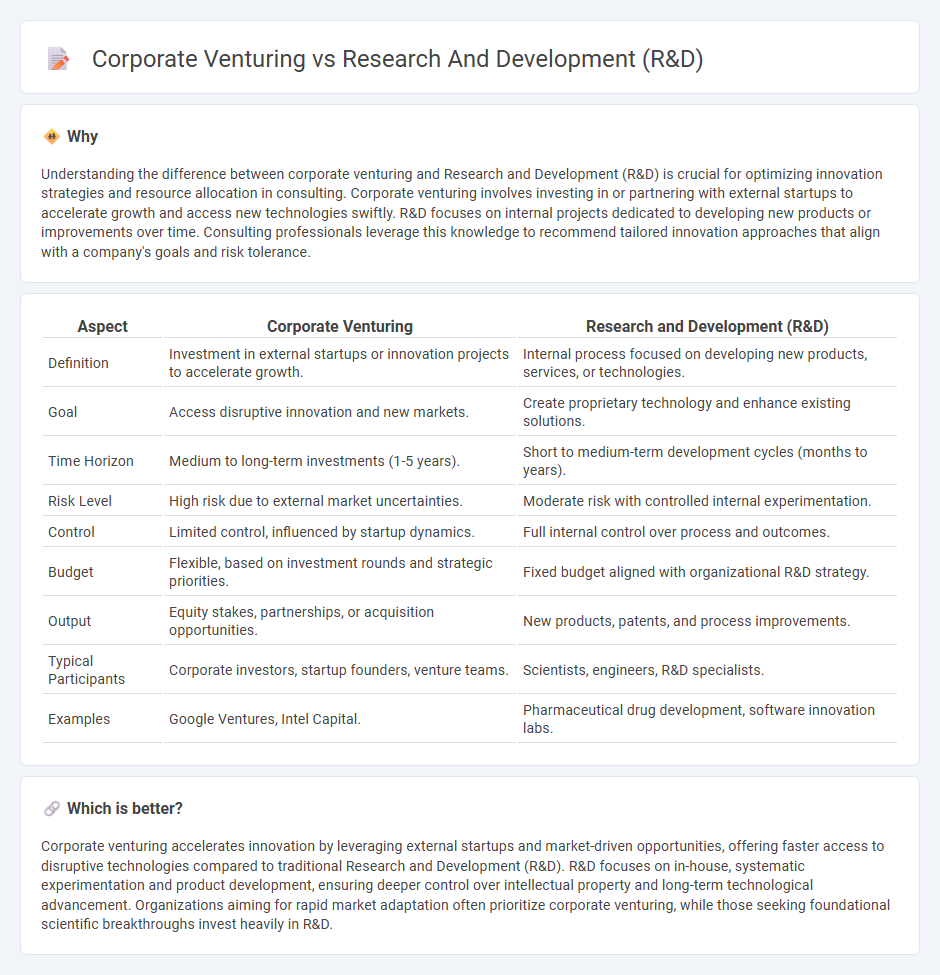
Corporate venturing accelerates innovation by partnering with startups and external ventures to access emerging technologies and new market opportunities, offering agility beyond traditional in-house efforts. Research and Development (R&D) focuses on systematic internal processes to create proprietary technologies and products, ensuring controlled progress within the company's core expertise. Discover how blending corporate venturing with R&D can drive competitive advantage and sustainable growth.
Why it is important
Understanding the difference between corporate venturing and Research and Development (R&D) is crucial for optimizing innovation strategies and resource allocation in consulting. Corporate venturing involves investing in or partnering with external startups to accelerate growth and access new technologies swiftly. R&D focuses on internal projects dedicated to developing new products or improvements over time. Consulting professionals leverage this knowledge to recommend tailored innovation approaches that align with a company's goals and risk tolerance.
Comparison Table
| Aspect | Corporate Venturing | Research and Development (R&D) |
|---|---|---|
| Definition | Investment in external startups or innovation projects to accelerate growth. | Internal process focused on developing new products, services, or technologies. |
| Goal | Access disruptive innovation and new markets. | Create proprietary technology and enhance existing solutions. |
| Time Horizon | Medium to long-term investments (1-5 years). | Short to medium-term development cycles (months to years). |
| Risk Level | High risk due to external market uncertainties. | Moderate risk with controlled internal experimentation. |
| Control | Limited control, influenced by startup dynamics. | Full internal control over process and outcomes. |
| Budget | Flexible, based on investment rounds and strategic priorities. | Fixed budget aligned with organizational R&D strategy. |
| Output | Equity stakes, partnerships, or acquisition opportunities. | New products, patents, and process improvements. |
| Typical Participants | Corporate investors, startup founders, venture teams. | Scientists, engineers, R&D specialists. |
| Examples | Google Ventures, Intel Capital. | Pharmaceutical drug development, software innovation labs. |
Which is better?
Corporate venturing accelerates innovation by leveraging external startups and market-driven opportunities, offering faster access to disruptive technologies compared to traditional Research and Development (R&D). R&D focuses on in-house, systematic experimentation and product development, ensuring deeper control over intellectual property and long-term technological advancement. Organizations aiming for rapid market adaptation often prioritize corporate venturing, while those seeking foundational scientific breakthroughs invest heavily in R&D.
Connection
Corporate venturing fuels innovation by channeling investments into startups and emerging technologies, which complement Research and Development (R&D) efforts within a company. R&D focuses on developing new products and technologies internally, while corporate venturing accelerates growth by integrating external innovations. This synergy enhances a company's competitive edge and access to cutting-edge solutions.
Key Terms
Innovation Pipeline
Research and Development (R&D) drives the innovation pipeline through focused internal efforts on product improvement and technology advancements, ensuring continuous enhancement of core competencies. Corporate venturing complements this by investing in external startups and disruptive technologies, accelerating access to novel solutions and market opportunities. Explore deeper insights on optimizing your innovation pipeline by integrating R&D with strategic corporate venturing.
Strategic Alliances
Research and Development (R&D) drives innovation through internal capabilities, while corporate venturing fosters growth by partnering with startups and emerging firms to access new technologies and markets. Strategic alliances between R&D teams and corporate venture arms enhance resource sharing, risk mitigation, and accelerated product development processes. Explore the distinct roles and synergies in R&D and corporate venturing to optimize strategic alliance outcomes.
Technology Scouting
Technology scouting plays a pivotal role in both Research and Development (R&D) and corporate venturing by identifying emerging technologies that can drive innovation and competitive advantage. While R&D focuses on internal advancement and refining existing capabilities, corporate venturing emphasizes external partnerships and investments in startups to accelerate technology acquisition and commercialization. Explore further to understand how technology scouting strategies distinctively enhance R&D and corporate venturing outcomes.
Source and External Links
Research and Development: R&D Guide - NetSuite - R&D involves innovative activities by businesses and organizations to create or improve products or services, aiming for growth and competitive advantage through systematic inquiry and problem-solving.
Definitions of Research and Development: An Annotated ... - R&D is defined as creative and systematic work to increase knowledge and devise new applications, including basic research, applied research, and experimental development, excluding routine or non-innovative tasks.
Research & Development (R&D) | Definition, Purpose, Types, Pros ... - R&D aims to find new knowledge or invent products and services, consisting of basic research, applied research, and development research that focuses on product creation, commercialization, and productivity improvements.
 dowidth.com
dowidth.com